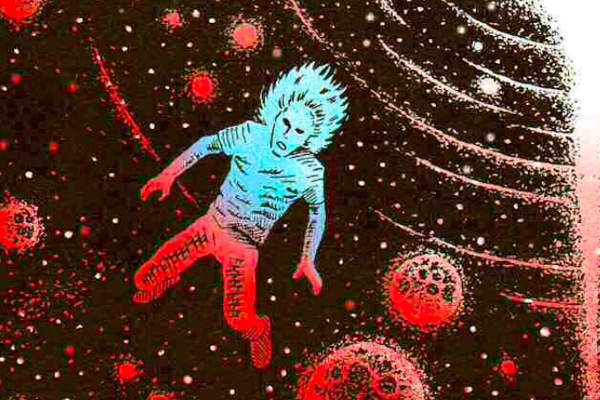Jeff Hopp’s Legend of the Mind, dedicated to the late Philip K. Dick, is a wonderfully bizarre read. The story follows the exploits and trips of a man named David. He’s a conspiracy theorist and self-proclaimed precog. Through traversing many strange worlds and situations inspired by, and paying homage to, Dick’s many works; the reality of Legend of the Mind’s story is always in question. For example, the visuals and dialogue pack in many references and allusions to Dick’s classic sci-fi tales and concepts. Some are a little more obvious than others.
Legend of the Mind’s art perfectly captures the weird and wild drug-fuelled hallucinations of its characters and world. The colors range from muted and pastel, to vibrant and neon. Everything, from the settings to the characters, fluctuate with a mix of cartoonish and realism. Overall, these come together, making everything feel just the right amount of distortion. It’s very impressive how many different tones the artwork and coloration can evoke. Much like its inspiration, this graphic novel similarly takes you to worlds of a campy sci-fi future, or a void of existential dread.
I’m a little sad to say that I didn’t immediately recognize the name Philip K. Dick. But I absolutely should have! His works and their adaptations have had a colossal influence on pop culture through the years. His notable novels and short stories include Do Androids Dream of Electric Sheep (later adapted into Blade Runner), We Can Remember It For You Wholesale (adapted as Total Recall), The Man in the High Castle, and The Minority Report. Research on Dick – his troubled life; his fascination with philosophy and existentialism; that exceptional creativity he has – clarified this comic for me and gave me a greater appreciation for it. Additionally, it also piqued my interest in exploring the canon of Philip K. Dick.
Legend of the Mind feels like a deeply personal and intimate work; both to its creator and to Dick. It is heart-warming—sometimes oddly so—and genuinely inspiring in its own way. Especially seeing the profound respect that the Hopp has for the late writer. Depending on your level of familiarity of Dick, you may miss out on some nuance and deep-cut references. But as a tribute to the writer’s life and his legacy, I feel that it strongly succeeds. Even if you have no idea what is happening in Legend of the Mind, it may still inspire you to explore his work that you may not be familiar with, as it did for me. In summary, Legend of the Mind is a stunning piece of art; it’s a love-letter to an influential creator; a message about how art like his can inspire us to be who we are, no matter how strange.

